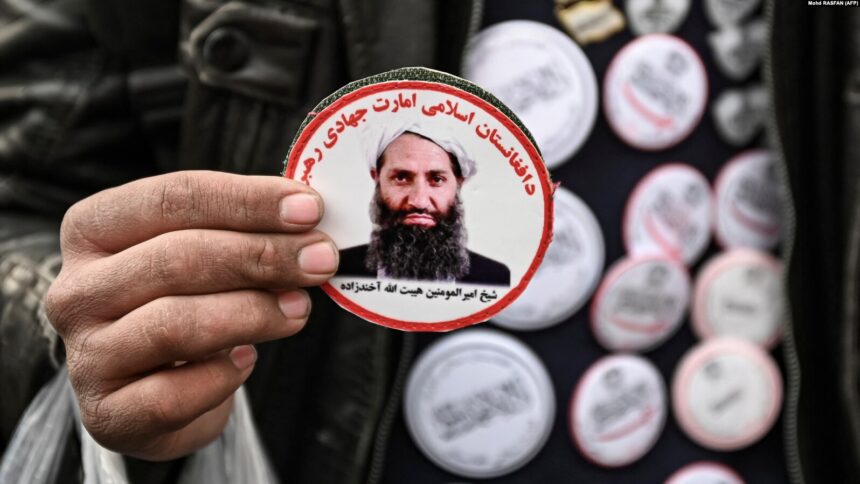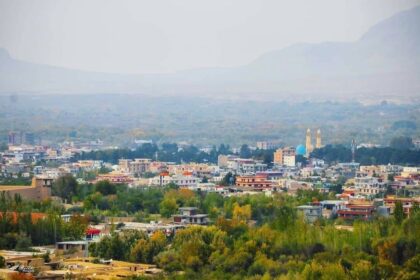RASC News Agency: In a newly leaked audio recording that surfaced on Wednesday, June 10, a senior Taliban district commander who recently met with the group’s elusive leader, Hibatullah Akhundzada, has disclosed disturbing new directives aimed at consolidating absolute control over Taliban fighters and isolating them from modern technology. According to the audio, Akhundzada expressed growing dissatisfaction with what he described as rising disobedience within the Taliban ranks. In a tone laden with authoritarian fervor, he reportedly warned, “Anyone who defies the Amir is contributing to the collapse of the Islamic system.” The Taliban leader has now ordered all fighters under his command to reaffirm their oath of allegiance to him extending the demand to their children while urging them to prepare for self-sacrifice in the name of the movement.
But the most contentious part of the recording concerns Akhundzada’s newly issued religious fatwa against smartphones. He declared the use of touchscreen phones a “grave sin” (Gunah-e-Kabirah) and explicitly banned all Taliban commanders, officers, and fighters from using them. He further threatened that any individual who dies while in possession of a smartphone may be considered to have died without faith (Iman) a chilling invocation designed to instill religious guilt and compliance. In his instructions, Akhundzada ordered that all smartphones among Taliban personnel be confiscated without exception, and that even in private homes, such devices should be seized from children. If individuals defy this order, he reportedly insisted that the phones be destroyed.
This latest directive is part of a wider campaign by the Taliban to monopolize control over information and suppress both internal dissent and external scrutiny. Smartphones and social media have remained some of the only tools through which civilians and whistleblowers have managed to document the group’s abuses, including violent crackdowns, public floggings, gender apartheid, and the growing ideological extremism at the heart of the Taliban movement. Analysts and human rights observers believe the Taliban’s campaign against smartphone usage is less about religious purity and more about political survival. The regime appears increasingly threatened by the potential for digital leaks, footage of intra-Taliban power struggles, and exposure of their brutal treatment of Afghanistani women and ethnic minorities. By outlawing smartphones, the Taliban seek to erase the last remaining lens through which their repressive practices can be revealed to the world.
Since seizing power in 2021, the Taliban have systematically dismantled Afghanistan’s fragile media sector, banned nearly all independent reporting, and imposed sweeping censorship laws. Internet access has been throttled or blocked in many provinces, particularly targeting women, youth, and urban communities seen as resistant to the regime’s ideological dogma. The new ban on smartphones now adds another layer to the Taliban’s growing technophobic agenda. It mirrors tactics used by other repressive regimes that fear the empowerment of civil society through digital connectivity. But unlike modern authoritarian states that attempt to surveil digital activity, the Taliban have chosen the path of total disconnection, reverting to a pre-modern, insular worldview where the only permitted source of authority is their interpretation of “sharia.”
Critics argue that Akhundzada’s decree is a dangerous example of how the Taliban continue to manipulate religion to justify their authoritarian grip on power. By equating digital access with spiritual corruption, the regime not only suppresses dissent but also reinforces a climate of fear within its own ranks. Fighters are increasingly trapped between loyalty to an opaque and aging leader, and the harsh consequences of modern engagement even within their personal lives. The Taliban’s war on smartphones, like their war on women’s education and civil liberties, is yet another chapter in their broader effort to turn Afghanistan into a hermetically sealed theocracy, detached from global norms and cut off from internal criticism. The international community must recognize these actions not as isolated incidents, but as integral to a sustained campaign to crush freedom, erase truth, and dismantle the last remaining tools of resistance.






